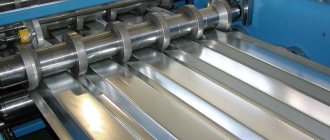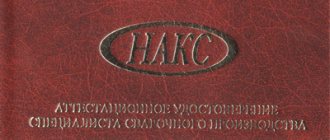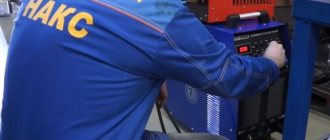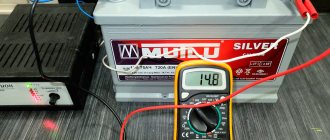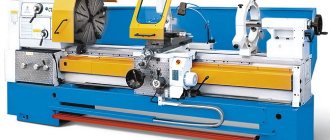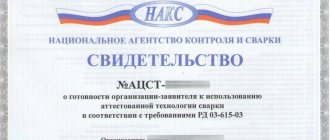Types of welder certification
Everyone working in the field of electric welding must, by law, undergo inspections as part of the rules for certification of Level I welding specialists - welders. Only after successfully passing the exams do they have the right to carry out work in their field. Such work remains under the control and consideration of Russian technical supervision. Welding technology certification is divided into categories. Below we present and describe in detail each type.
Primary
Primary certification of welders - it is carried out for welders who did not previously have a permit.
Extraordinary
When studying information about which certification of a welder is considered extraordinary, you need to know that welders undergo it before being allowed to perform electric welding work after temporary suspension from work in case of violation of welding technology or repeated cases of poor-quality execution of electric welding connections.
Additional
People who wish to expand the work list of the certification card may obtain additional permission. In fact, this is an expansion of the scope of work that a specialist can perform.
Periodic
It is carried out in order to extend the validity period of the NAKS certificate. Masters undergo a knowledge test according to the current Rules, which were approved by the country's supervision in the field of technology in 2000 (PB 03-273-99). It is carried out with the passing of both theory and welding exams for candidates at level 1, and for engineers - only theory.
NAKS - what is it?
The National Welding Control Agency is a self-regulatory organization specializing in certification of welding production, technological methods, and equipment for performing these works. If the plant assessment is successful, information about it is entered into a register accessible to everyone. Any potential client of a company can view information from this register to ensure that its activities comply with legal requirements. NAKS also issues a certificate of certified welding technology.
The key purpose of issuing such a document is to ensure reliability, safety and quality, and to protect clients from unscrupulous service providers.
Obtaining it is important primarily for the company itself. This gives it the opportunity to operate in the Russian and European markets. Application for certification of welding technology
Specialists
Specialists organize and control the production of welding structures, equipment and parts. They study design with production and technological documentation for production, installation and reconstruction using welding. They study the diagram of welded products, determine special conditions and requirements for performing welding work, and also develop technical specifications and technical processes.
Employees determine the types of welding materials to complete the task, provide the workshop with qualified personnel, provide instructions on labor safety at the work site, and keep records of defects. Due to the complex, dangerous work, they must obtain a permit in order to perform electric welding and surfacing work.
Need help? Contact us!
The key to successfully passing the test is thorough preparation. It is necessary to select the most suitable certification center, prepare a package of documents, and fill out an application. You can do this work yourself. But it is better to turn to professionals who know their business very well. The staff of the expert training center have extensive experience, so they will quickly and efficiently cope with the task. This will allow you to avoid bureaucratic delays and obtain a certificate in the shortest possible time. Do you want to know the cost, clarify any nuances or make an application? Just contact us in any way convenient for you. Our contacts are listed on the website.
Certification of welding production specialists, what it is and why (PB 03-273-99)
Inspection of production workers according to PB 03-273-99 is a procedure during which a set of mandatory documents is issued. Upon their issuance, welders have the opportunity to work at any hazardous special production facility. Uncertified employees cannot be allowed to work. This is specified in the rules for certification of welders and welding production specialists.
How to check the authenticity of a document? Anyone can check the documents to see if the facts are true. Read about how to do this in our article - How to check your NAKS certificate using the register of welders - find yourself by last name on the official website.
As a rule, certification is valid from 2 to 5 years (for welders - 2 years, for specialists of levels 2 and 3 - 3 years, for holders of level 4 - 5 years), and then re-certification is required. The authenticity of the certification certificate can be checked at NAKS. The welder's certification protocol is entered into the state register.
In what case will everything be successful?
When carrying out the procedure, they rely on the provisions of RD 03-614-03. The basic requirements for it were indicated earlier. We are talking about the presence of at least 2 workers and one technologist of the 3rd level who have already confirmed their qualifications and received the appropriate certificate. If this condition is met, the organization prepares a package of necessary papers and sends it to NAKS.
The agency checks them and decides whether to admit him to the procedure or not. If the verdict is positive, then a commission is created and a plan is developed. Information about this is communicated to the applicant.
Scope of certification
The certification document (certificate) applies to those areas in which knowledge was tested. This is indicated in the rules for certification of welders. The permit is aimed at performing work with various equipment. The document is required for working with boiler, gas, oil and gas production, metallurgical, and special handling equipment.
Workers who have managed to pass a special test in accordance with the requirements of regulatory documents and have received a certificate have the right to work with petrochemical, oil refining, explosion-hazardous, and chemical production equipment. They can work with mining and hazardous cargo transportation equipment. They have the right to work with special construction structures and special equipment for steel bridges.
Here is the full list of groups:
The document must include the following information:
- about the welding method available to the production employee;
- about the nature of the work process;
- a group with a brand of special materials that a person can use in electric welding;
- about welding material (electrodes, wire, gas, etc.) that can be used in work;
- about the range of diameters and thicknesses of materials that the welder can work with;
- characteristics of the welding joint such as the angle of the edges, the amount of bluntness;
- about the type of weld, the type of special connection available for work;
- position of seams (horizontal, vertical, ceiling, bottom)
- about the type of electrode coating (if fluxes are used, then their brand, if gases, then their name).
Certification of welders at enterprises and organizations allows them to carry out electric welding of pipes, pipes with sheets, etc. It gives them the right to work with butt and fillet welds. With the certificate, an employee can weld and fuse electrodes with a diameter of 1.6 mm with basic, acidic, rutile, rutile-cellulose coating.
The certification document (certificate) allows for electric and gas welding or surfacing of parts in a lower, horizontal, ceiling, vertical, inclined spatial position.
It can use four types of connections to operate. According to regulatory documents, these are: connections made on one side, without the use of a lining; on a removable or remaining lining, performed on several sides, with and without root seam stripping. A butt weld is used in a special butt joint. Fillet welds are used in corner, T-joint, and special lap joints.
Why and who needs this?
Note! The activities of the commission are regulated by special regulatory documentation. All requirements that the commission imposes on the applicant organization are regulated by the designated documents.
In addition, the certificate of certification of welding technology will have to be re-obtained by those organizations that make changes to previously certified technologies that were not provided for in the previously obtained certificate.
Extraordinary certification is carried out at the request of regulatory authorities or technical control services on the part of the customer.
Production certification of welding technology under the supervision of NAKS is carried out in stages. The procedure is complex and capacious, each stage is characterized by certain features and subtleties. Knowing these nuances will help the organization avoid troubles in the future.
Main types of research conducted by NAKS:
- research testing is carried out within the framework of current legislation and is aimed at confirming compliance or identifying non-compliance with the characteristics of welds made from both plastic and metal materials;
- production inspection is necessary to monitor organizations and enterprises carrying out welding work at high-risk facilities. Production inspection under the control of NAKS can be primary, secondary or extraordinary.
Certification procedure
The procedure for issuing a permit for electric welding work is as follows:
An application is sent to the certification service, attaching additional documents;
Then the service checks the documents and begins the exam. The test begins with a practical test (if not passed, the welder can later pass the test, doing this no earlier than thirty days later).
The third step is a mandatory one with an additional exam in writing or on a computer. In the first test, according to the requirements of the documents, there are 20 mandatory questions, 15 additional ones. questions. Topics are selected with the help of a specially assembled commission. They are compiled from a collection of topics. If a person was able to answer 80% of the topics correctly, then the state exam ends successfully.
If the practical and theoretical exams are successfully passed, the commission will issue a protocol separately for the person for each welding. A conclusion with other documents responsible for quality control of welding joints will remain attached to the protocol.
The last step will be to issue a certificate; its form is approved by NAKS and does not actually change. The external certificates differ in color; for welders the cover (cover) is blue, and for specialists from levels 2 to 4 it is red.
Attestation process
Before confirming qualifications, the employee undergoes training and testing of knowledge on industrial safety at work. He provides the exam result to the center department. In 2022, this requirement was no longer required; welders are now not required to have an industrial seal.
The qualification confirmation (certification) procedure includes several state exams: this is a theoretical part, which is most often carried out in the form of a test, followed by an interview and, of course, a practical exam of a welding specialist. Employees who own additional education in the manufacturing sector with repairs and installation of polymer materials. They are exempt from the exam (from its theoretical part).
Simultaneous certification of employees is permitted no more than within three groups of special technical facilities. Employees for the new group of technical devices take a special purpose exam.
Exam
At the first exam, the certified employee asks at least thirty questions to the person being certified, and at the additional exam, at least twenty questions, tasks in the area related to the scope of his certification. That is, if a specialist submitted documents indicating certification groups for welding production, for example KO, OKHNVP and PTO, then he will be asked questions within these groups. Examinations are conducted in written form. As part of the decision of the special commission accepting the exam, the certified person may receive an interview.
An employee passes the mandatory exam if he answers most of the questions and successfully completes the practice assignment, taking into account an additional interview. If an employee is certified for several working types, for example, electric arc welding or argon-arc electric welding, the ticket for passing state exams must contain at least five topics about a special welding method.
During qualification confirmation, the candidate receives a specific series of practical tasks and tests, according to those groups of dangerous technical devices for which he is certified. In the theoretical part, the ticket must contain five questions in the group of special technical devices.
Retake
If a specialist was unable to pass one or more state exams, he will retake the failed tests within six months, but not earlier than a month from the first test. The date for the examination retake is agreed with the management of the certification center. If the employee does not pass the exams, he will not pass the test and the result of his examination work will be canceled.
Upon completion of the special inspection, the certified person receives a commission report on the state form. It is issued in two copies. It is signed by the commission chairman, and the director verifies it. Copies of the certificate are kept in the new center and with the applicant. Upon completion of certification, specialists receive new certificates, protocols and a certificate of work performed by the certification center. Their form is presented in the state application.
How to get a certificate?
To undergo certification, contact our managers in any convenient way. You will need to prepare an application, provide a certificate of employment, educational documents and confirmation of the employee’s qualifications.
After receiving the documents, a date for qualification tests is set. If the exam results are unsatisfactory, a retake will be scheduled no earlier than a month later.
Leave a request for the service, we will contact you shortly and answer all your questions.

